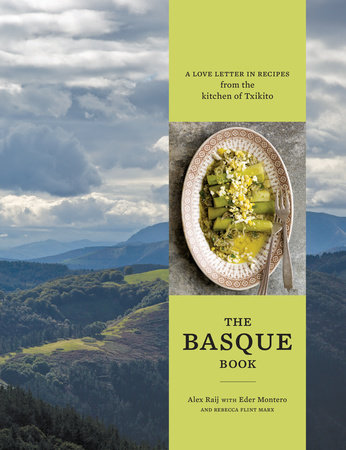Excerpt
The Basque Book
contentsIntroduction 1
About the Book 11
Basque Basics: fundamental techniques and ingredients 15
Txikiteo: the art of pintxos 41
Huerta: the basque kitchen garden 77
Huevos: eggs all ways 111
Buscando Bakalao: finding cod 135
Putxero, Sopa, and Potaje: soups and stews for all seasons 183
Txokos, Asadores, Sagardotegis, and Ferias: gathering the basque way 213
Goxua: sweets 231
Bebidas: beverages 263
Ingredients 276
Sources 287
Acknowledgments 288
introductionIf, when I was a child, someone had told me, “One day, you’re going to open a small Basque restaurant,” I wouldn’t have been too surprised. In fact, I would have probably shrugged my shoulders and said, “Yes, of course I am.”
For as long as I can remember, I have wanted to open a restaurant. I grew up in Minnesota, but my parents emigrated from Argentina just before I was born, and my sisters and I were raised around a table with lively Spanish conversation and with food that was strange by midwestern standards (at the time, we may have been the only Argentine Jews in Minneapolis). Growing up, my favorite pastimes were playing restaurant, dreaming about food, and reading cookbooks, so opening a restaurant someday would not have seemed impossible.
As fate would have it, I grew up and opened a small restaurant in one of the biggest cities in the world. But the part that would have surprised me as a child—and, in a way, still surprises me today—is that my restaurant, Txikito, is Basque. I can imagine my ten-year-old self scratching her head and asking, “What does
Basque mean?” I’ve been running Txikito since 2007, and I still don’t have a definitive response to that question. But it’s one that I strive to answer, for myself and for the people we feed, every day.
Cooking is a perfect vocation for people who like to find and make connections. To me, food is a way to tell a story, and even though I don’t want to tell the same stories over and over again, I do want a common thread to connect the stories that I do tell. My husband, Eder, who is also my co-chef at Txikito, puts it a little differently: he says I’d open a new restaurant every week if I could. So it’s not surprising that he is both frustrated by and supportive of this story, which is the story of how I met Basque food and found a home in a cuisine that has held my attention in ways that no other can.
Part of what made both Basque food and Eder, who is Basque, so attractive is that Basque cooking meant that I could return to living my life in Spanish. My affinity goes deeper than that, however: I love all of the cuisines of Spain, but Basque food has a very specific mystique. It doesn’t hide behind strong Mediterranean flavors. Instead, it celebrates single ingredients and tastes and constantly reminds the cook that “simple” doesn’t necessarily mean “easy.” Basque food makes you a better cook. It teaches you to respect ingredients, embracing and amplifying their natural flavors. I’d argue that many professional cooks would get better if they practiced Basque cooking, as it forces you to unlearn bad habits and pay attention to details. The Basque cook responds to
la materia prima, or main ingredients, a tiny bit differently each time. Intuitively understanding how to make these minor adjustments is a sign of the cook’s experience and skill.
Mussels with white beans mejillones y pochas en salsa verde
serves 4
This light stew of white beans and bouchot mussels is a Txikito signature. When I first encountered
pochas, a creamy white bean typical of Navarra, I envisioned a salad or a blond stew. It turns out they are often served smothered with quail in a rich dark sauce. I think the lightness of this preparation is more respectful of the bean and reflects the general approach to cooking at the restaurant. Here, the beans take the place of the potatoes commonly found in dishes made with
salsa verde, which, along with
salsa pil pil,
salsa tinta, and
salsa bizkaína, is one of the most important sauces of Basque cuisine. When making the sauce, be sure to cook off the alcohol before adding the beans, or the dish will be too acidic. This warm stew can be enjoyed all year long.
2 pounds large bouchot mussels
2 tablespoons extra-virgin olive oil, plus more for finishing
3 cloves garlic, thinly sliced
2 flat-leaf parsley sprigs, left whole, plus . bunch, chopped, for finishing
1/4 cup dry white wine
1/4 cup manzanilla sherry
3 cups cooked white beans, preferably pochas or other heirloom thin-skinned, white- or green-fleshed shelling beans, drained
Kosher salt
1/2 teaspoon lemon juice (optional)
Extra-virgin olive oil, for finishing
Cook the mussels as directed on page 161, reserving the mussel meats and 1 cup of the mussel stock. If using chilled reserved mussels, bring them to room temperature while preparing the beans.
In a heavy saucepan, heat the oil over medium-low heat. Add the garlic and cook, stirring, for no more than 1 minute, until just opaque. Add the parsley sprigs and cook until they wilt, then add the white wine and sherry and simmer for about 1 minute to cook off the alcohol. Add the beans and the 1 cup mussel stock and cook for 4 to 5 minutes, until warmed through.
Remove from the heat, remove and discard the parsley sprigs, fold in the mussels and almost of all of the chopped parsley, and then warm through gently over medium-low heat to avoid overcooking the mussels. Taste. Stir in salt and lemon juice if needed. Top with a little more chopped parsley and a thread of olive oil. Serve in warm bowls.




